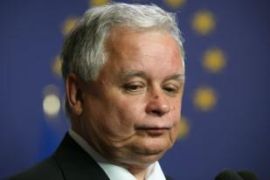EU leaders struggle on agreement
Britain and Poland threaten to use their veto if demands are not met.

The two-day summit was scheduled to arrive at a new treaty to replace the EU constitution rejected by French and Dutch voters.
Acrimonious debate
Nearly all other EU states apart from Poland favour the voting formula that requires 55 per cent of member states representing 65 per cent of the EU population to pass decisions.
Chancellor Merkel met Lech Kaczynski, the Polish president, three times in 12 hours to try to ease his concerns over the system which he says would reduce Warsaw’s influence in the EU.
“We’re working hard. The problems are not yet solved but everyone is trying,” Merkel said.
But acrimony was growing over Poland’s repeated references to its suffering at the hands of Nazi Germany during World War II to justify its opposition the proposal.
Hans-Gert Poettering, a German conservative who is president of the European Parliament, said: “I’m very sad about the comments about European history.”
Jaroslaw Kaczynski, the Polish prime minister and the president’s twin brother, was unapologetic.
He said: “This is simply the truth. This is not about settling accounts with the Germans.
This is about making people aware about a certain moral situation.”
‘Red lines’
Blair, who also held a one-on-one meeting with Merkel, also appeared in no mood to compromise.
He said Britain would not cede national control in four key areas – foreign policy, the judicial and police system, tax and social security rules, and an EU charter of fundamental rights.
Britain is “not playing games” by insisting on its “red lines” at the summit, Blair’s spokesman said, stressing that he was ready to block a deal if necessary.
“There will not be a deal unless the four red lines are met, and that’s just a simple fact of life,” the spokesman said.
Ursula Plassnik, the Austrian foreign minister, expressed concern that Britain had hardened its stance.
“This is a development that should worry all of us, including Britain,” she said.
London’s problems are issues that “go to the core of what we understand the European Union to be”, Plassnik said.